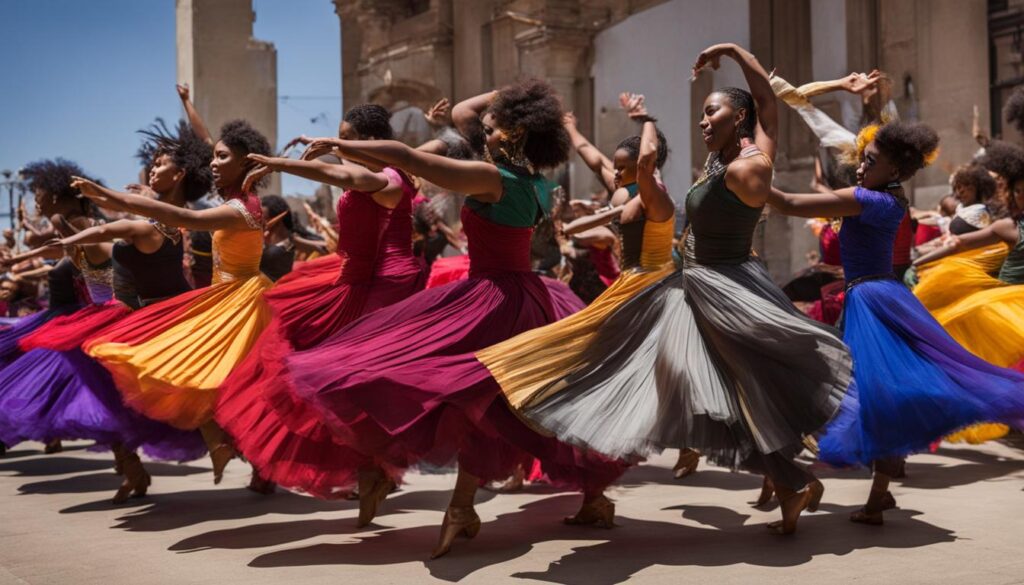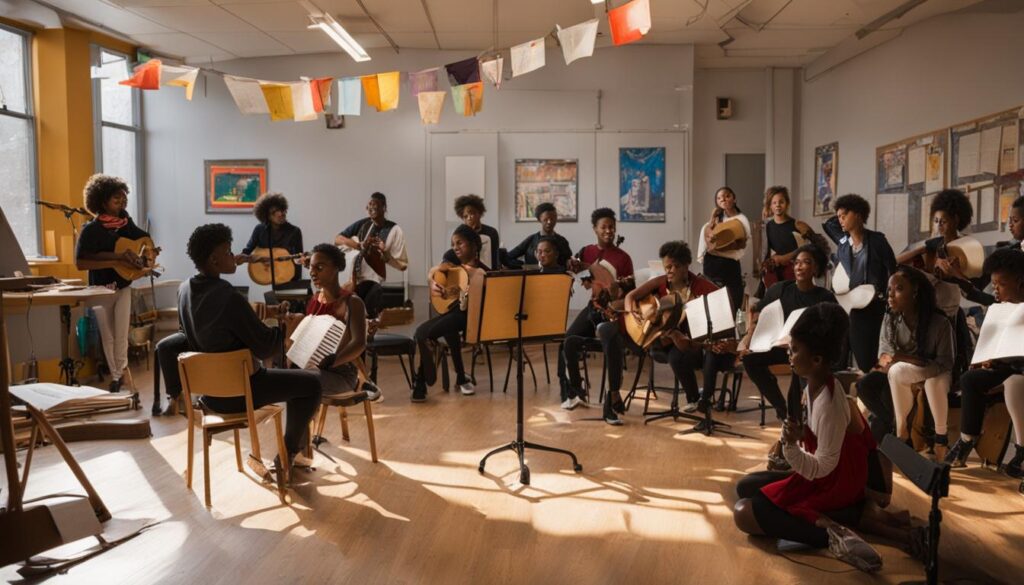A performing arts degree opens up a world of possibilities for graduates. While many may envision a career on stage or screen, there are numerous other career paths to explore. Some common careers for performing arts graduates include actors, dancers, directors, singers, stage managers, therapists, and teachers. Performing arts degrees are highly practical and offer a range of specialisms, such as acting, dance, voice, physical theatre, and music theatre. Graduates can choose to pursue freelance work, collaborate with other artists, or even start their own shows. Salaries in the performing arts industry vary widely depending on the type of role and production size.
What Can I do with a Performing Arts Degree?
- Performing arts degrees offer diverse career options beyond acting and dancing.
- Graduates can pursue freelance work or collaborate with other artists.
- Salaries in the performing arts industry vary based on the type of role and production size.
- Performing arts degrees provide specialized training in acting, dance, voice, and more.
- Performing arts graduates can explore careers as actors, directors, therapists, teachers, and more.
What is Performing Arts?
Performing arts is a form of creative activity that is performed in front of an audience. It encompasses various disciplines such as drama, music, and dance. The essence of performing arts lies in the live enactment and expression of artistic ideas, emotions, and narratives.
A key aspect of performing arts is its ability to convey stories and evoke emotions through the interaction of performers and the audience. It goes beyond mere entertainment, allowing individuals to explore and reflect on different aspects of the human experience.
Performing arts degrees are highly practical, immersing students in interdisciplinary practice and preparing them for the competitive industry. These programs offer an array of specializations, including acting, dance, voice, physical theatre, music theatre, sound design, and digital video.
Courses in performing arts celebrate the diversity and versatility of creative expression within both live and digital contexts. They equip students with the necessary skills and knowledge to explore their artistic potential while encouraging experimentation and collaboration.
A typical performing arts degree can be completed in three or four years, leading to a bachelor of arts (BA) degree. Throughout their studies, students engage in a variety of practical workshops, academic lectures, and hands-on experiences. This comprehensive approach enables them to develop a well-rounded understanding of the performing arts industry.
Performing arts serve as a platform for individuals to express their creativity, explore new ideas, challenge societal norms, and communicate with audiences in profound and meaningful ways. It is a dynamic and vibrant field that continues to evolve and push boundaries, showcasing the power of artistic expression.
What Do You Learn in a Performing Arts Degree?
Performing arts degrees provide a unique blend of practical and academic learning, equipping students with the skills and knowledge necessary for a successful career in the field. Whether you have a passion for acting, dance, music, or any other performing arts discipline, pursuing a degree in performing arts can offer you a comprehensive understanding of your chosen craft.
From day one, performing arts students are immersed in a hands-on learning experience. Practical workshops allow you to develop your artistic skills and explore different techniques under the guidance of experienced professionals. These workshops provide a safe and supportive environment for experimenting with your creativity and honing your performance abilities.
In addition to practical workshops, lectures play a crucial role in a performing arts degree. These lectures cover a range of topics, including the history and theory of performing arts, analysis of different performance styles, and the social and cultural impact of the arts. These academic elements provide a solid foundation for critical thinking, allowing you to approach your craft with a deeper understanding and explore the wider context in which it exists.
Work experience is another integral component of a performing arts degree. Many universities offer opportunities for students to gain real-world experience through internships, placements, or collaborations with local theaters and performance companies. This work experience allows you to apply your skills in a professional setting, build industry connections, and enhance your employability upon graduation.
Performing arts degrees also offer the flexibility to choose a particular pathway that aligns with your interests and career goals. While most degrees provide a foundation in various disciplines, such as acting, dance, and music, they also allow you to specialize in a specific area of interest. Some universities even offer dedicated degrees for specific branches of the performing arts, providing in-depth training tailored to your chosen field.
For high school students considering a performing arts degree, it is beneficial to take related subjects, such as drama, music, or dance, to strengthen your skills and knowledge in your chosen discipline. Additionally, be prepared to attend auditions, as they are often a part of the application process for performing arts programs.
- Performing arts degrees offer a combination of practical and academic learning.
- Practical workshops and lectures provide hands-on training and a deeper understanding of performing arts.
- Work experience opportunities allow students to develop their skills in a professional context.
- Performing arts degrees offer the flexibility to choose a particular pathway that aligns with your interests and career goals.
- High school students interested in studying performing arts should consider taking related subjects and be prepared to attend auditions.


Career Paths for Performing Arts Graduates
Performing arts graduates have a wide variety of career paths to choose from. While some pursue traditional performing arts careers such as acting, dancing, or directing, others explore alternative paths in related fields. These can include broadcast presenting, teaching, scriptwriting, theatre stage management, marketing, public relations, and journalism.
Many professionals in the industry work on short-term or freelance contracts and find opportunities through networking, auditions, collaborations, and self-produced shows. These non-traditional career paths offer flexibility and the chance to explore different aspects of the performing arts industry. Graduates can leverage their skills and creativity in various professional roles, contributing to the cultural and entertainment sectors.
For those interested in teaching, a performing arts degree can lead to employment opportunities in schools, colleges, and universities, where graduates can nurture the next generation of performers and encourage artistic expression. Scriptwriting and theatre stage management are options for those who prefer working behind the scenes to bring productions to life.
Employment Opportunities in Performing Arts
- Broadcast Presenting: Hosting television or radio programs, covering live events, conducting interviews, or providing commentary.
- Teaching: Sharing knowledge and skills with aspiring performers and developing their talent in educational settings.
- Scriptwriting: Crafting compelling stories for theatre, film, television, or digital media.
- Theatre Stage Management: Overseeing the technical and logistical aspects of a production, ensuring smooth performances.
- Marketing: Promoting shows, events, and artists through strategic campaigns and creative branding.
- Public Relations: Building relationships with media outlets, managing press releases, and handling public image and reputation.
- Journalism: Reporting on performing arts, art criticism, writing reviews, or conducting interviews.
The performing arts industry offers diverse employment opportunities, and graduates can carve out unique career paths based on their interests, talents, and aspirations. It is important to note that salaries in this industry can vary greatly depending on the type of role, experience level, location, and the size of the production.


Famous People with Performing Arts Degrees
Many successful actors and actresses around the world have studied performing arts at university. Some notable examples include Tom Hanks, who studied theatre at California State University, and Kristin Chenoweth, who attended Yale University. Matt Lucas and David Walliams, known for their comedy work in “Little Britain,” both studied performing arts at the University of Bristol. Meghan Markle, the Duchess of Sussex, also pursued a degree in theatre at Northwestern University before embarking on her successful acting career.
These talented individuals demonstrate that a performing arts degree can pave the way for rewarding roles both on and off the stage. Their education equipped them with the skills and knowledge necessary to excel in the performing arts industry.
From captivating audiences in film and television to enchanting theatergoers on Broadway, these famous performers with performing arts degrees have left a lasting impact on the industry. Their success serves as an inspiration for aspiring actors and actresses, showcasing the potential of a performing arts education.
FAQ
What career options are available for performing arts graduates?
Performing arts graduates can pursue careers as actors, dancers, directors, singers, stage managers, therapists, or teachers. There are also opportunities in broadcast presenting, scriptwriting, theatre stage management, marketing, public relations, and journalism.
What is performing arts?
Performing arts is a form of creative activity that is performed in front of an audience. It encompasses disciplines such as drama, music, and dance.
What do you learn in a performing arts degree?
In a performing arts degree, you gain practical skills through a combination of practical workshops and lectures. The curriculum includes a foundation in various disciplines before allowing you to choose a particular pathway. You may also have the opportunity to participate in work experience to develop your skills in a professional context.
What are the career paths for performing arts graduates?
Performing arts graduates can pursue careers in traditional performing arts roles such as acting, dancing, or directing. They can also explore alternative paths in related fields such as teaching, scriptwriting, theatre stage management, marketing, public relations, and journalism. Many professionals in the industry work on short-term or freelance contracts and find opportunities through networking, auditions, collaborations, and self-produced shows.
Who are some famous people with performing arts degrees?
Some famous people with performing arts degrees include Tom Hanks, who studied theatre at California State University; Kristin Chenoweth, who attended Yale University; and Matt Lucas and David Walliams, who studied performing arts at the University of Bristol. Meghan Markle, the Duchess of Sussex, also studied theatre at Northwestern University before pursuing a successful acting career.

